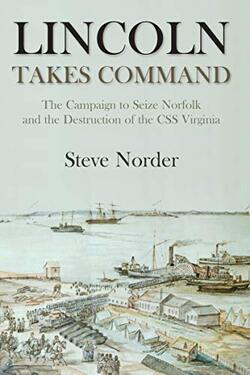
Steve Norder
Savas Beatie, 2019, 336 pages, $32.95
ISBN: 978-1-61121-457-4
Image courtesy of amazon.com
When anyone thinks about President Lincoln, certain images are conjured in their minds. The usual tends to be statesman, lawyer, and obviously, president. But one aspect that might not come to mind is commander of military forces in battle. Lincoln Takes Command is a book that details one such instance with Lincoln when he sailed to Fort Monroe in Hampton Roads, Virginia. Written by Steve Norder, he accounts when a president takes command of land and sea forces to launch a campaign. These operations would mold how the following months would occur during the Peninsula Campaign being led at the time by George McClellan.
Steve Norder has held many careers, including genealogist, author, teacher, book editor, newspaper reporter, you name it. He has always had a major fascination with the American Civil War and has written a number of pieces for Civil War Times. He is currently a member of the Atlanta Civil War Round Table.
When learning American History in school, I was told many times that Presidents did not go to the battlefield and lead tactics. The only time they could recount that was a pseudo leadership during the Siege of Washington D.C. with James Madison, but he wasn’t leading much. So when Lincoln Takes Command appeared, I was intrigued. I had heard of times when Lincoln went to battlefields, but rarely during the fighting, but this was something else. I don’t have a great depth of knowledge on the Peninsula Campaign, but if you’re looking for a book to fill in that gap, this might be it. Within the span of a week, Lincoln spoke with other commanders, studying the maps of the area, and issued orders about the proper ways to progress in the fight. Norder’s narrative is presented through chapters as an orderly timeline, and for one of the first times I have ever read in a book about Lincoln, I never felt as though he was the President. I felt more that he became a commander on the field that was necessary for this fight to be won. The book is well researched and contains much of the primary sources necessary to tell this fascinating story. From what I could tell, Norder treated this subject as a labor of love, and it shows. Some authors have criticized Lincoln for not being a General’s President, but I think the work presented here shows that the knowledge he gained from this week’s campaign gave him what he needed to properly lead from Washington.
I highly recommend this book to anyone interested in Lincoln. I think that it not only portrays the President as someone who can lead when the situation arises, but it gives readers a different aspect of him during the Civil War that isn’t fully talked about anymore. Thanks to the efforts of Norder, he has brought this interesting campaign to full light and we should thank him for his work. Anyone who has an extensive library of Lincoln would find this book to be rather welcomed. And for that, it shows that Norder truly understood what was needed in this era of Civil War academia.
 RSS Feed
RSS Feed
